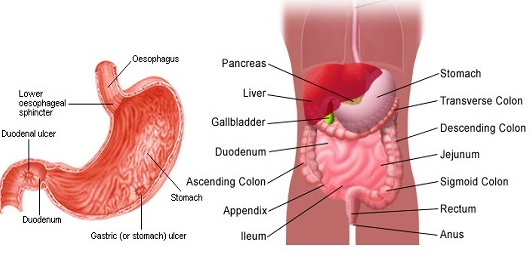 What causes stomach ulcers?
What causes stomach ulcers?Stomach ulcers are almost always caused by one of the following:
an infection with the bacterium Helicobacter pylori (H. pylori)
long-term use of nonsteroidal anti-inflammatory drugs (NSAIDs), such as aspirin, ibuprofen, or naproxen
Rarely, a condition known as Zollinger-Ellison syndrome can cause stomach and intestinal ulcers by increasing the body’s production of acid. This syndrome is suspected to cause less than 1 percent of all peptic ulcers.
Symptoms of stomach ulcers
A number of symptoms are associated with stomach ulcers. The severity of the symptoms depends on the severity of the ulcer.
The most common symptom is a burning sensation or pain in the middle of your abdomen between your chest and belly button. Typically, the pain will be more intense when your stomach is empty, and it can last for a few minutes to several hours.
Other common signs and symptoms of ulcers include:
- dull pain in the stomach
- weight loss
- not wanting to eat because of pain
- nausea or vomiting
- bloating
- feeling easily full
- burping or acid reflux
- heartburn (burning sensation in the chest)
- pain that may improve when you eat, drink, or take antacids
- anemia (symptoms can include tiredness, shortness of breath, or paler skin)
- dark, tarry stools
- vomit that is bloody or looks like coffee grounds
Talk to your doctor if you have any symptoms of a stomach ulcer. Even though discomfort may be mild, ulcers can worsen if they are not treated. Bleeding ulcers can become life-threatening.
How are stomach ulcers diagnosed?
Diagnosis and treatment will depend on your symptoms and the severity of your ulcer. To diagnose a stomach ulcer, your doctor will review your medical history along with your symptoms and any prescription or over-the-counter medications you are taking.
To rule out H. pylori infection, a blood, stool, or breath test may be ordered. With a breath test, you will be instructed to drink a clear liquid and breathe into a bag, which is then sealed. If H. pylori is present, the breath sample will contain higher-than-normal levels of carbon dioxide.
Other tests and procedures used to diagnose stomach ulcers include:
Barium swallow: You drink a thick white liquid (barium) that coats your upper gastrointestinal tract and helps your doctor see your stomach and small intestine on X-rays.
Endoscopy (EGD): A thin, lighted tube is inserted through your mouth and into the stomach and the first part of the small intestine. This test is used to look for ulcers, bleeding, and any tissue that looks abnormal.
Endoscopic biopsy: A piece of stomach tissue is removed so it can be analyzed in a lab.
Treating stomach ulcers
Treatment will vary depending on the cause of your ulcer. Most ulcers can be treated with a prescription from your doctor, but in rare cases, surgery may be required.
It is important to promptly treat an ulcer. Talk to your doctor to discuss a treatment plan. If you have an actively bleeding ulcer, you will likely be hospitalized for intensive treatment with endoscopy and IV ulcer medications. You may also require a blood transfusion.
Healthful diet
In the past, it was thought that diet could cause ulcers. We know now this is not true. We also know that while the foods you eat will not cause or cure a stomach ulcer, eating a healthful diet can benefit your intestinal tract and overall health. In general, it is a good idea to eat a diet with lots of fruits, vegetables, and fiber.
That said, it is possible that some foods play a role in eliminating H. pylori. Foods that may help fight off H. pylori or boost the bodys own healthy bacteria include:
- broccoli, cauliflower, cabbage, and radishes
- leafy greens, such as spinach and kale
- probiotic-rich foods, such as sauerkraut, miso, kombucha, yogurt (especially with lactobacillus and Sacharomyces)
- apples
- blueberries, raspberries, strawberries, and blackberries
- olive oil
If you think you have a stomach ulcer, these may be good foods to add to your daily diet. Learn more about foods that may be good for stomach ulcers — and foods that may not be.
Your Health Is Our Concern!
Mawuena Workartey/ Ghanahospitals.org